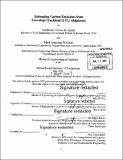Estimating carbon emissions from less-than-truckload (LTL) shipments
Author(s)
Veloso de Aguiar, Guilherme; Woolard, Mark Anderson
DownloadFull printable version (11.24Mb)
Other Contributors
Massachusetts Institute of Technology. Engineering Systems Division.
Advisor
Edgar Blanco.
Terms of use
Metadata
Show full item recordAbstract
Less-than-truckload (LTL) is a $32-billion sector of the trucking industry that focuses on moving smaller shipments, typically with weights between 100 and 10,000 pounds, that do not require a full trailer to be moved. Currently, there are no widely accepted methods to estimate carbon emissions from LTL shipments which take into account all the complexities of a typical LTL network. This thesis seeks to address this issue by suggesting a methodology that allows different parties to estimate the emissions of individual LTL shipments with minimal input information. Throughout this research, we worked with C. H. Robinson, a Third-Party Logistics Provider (3PL), and Estes Express Lines, a privately-owned freight transportation company, and analyzed more than 1.5 million shipments. We developed two calculation tools: a detailed model, specifically designed for and based on Estes Express' network and operations, and a lower-precision generic model, adapted from the detailed one so that it could be applied to carriers whose network characteristics are unknown. We also assessed current estimation methods and found that they tend to underestimate the emissions from LTL shipments primarily because (1) they rely on direct over-the-road distances as opposed to actual shipped distances, which must include the intermediate stops, and (2) they fail to factor in the pick-up and delivery (P&D) sections, focusing solely on line haul operations. Therefore, while existing initiatives such as the GHG Protocol and the EPA SmartWay program provide guidance on how to estimate carbon emissions from transportation in general, the LTL industry still needs a specific approach that takes into account all of its unique characteristics. This thesis provides a contribution in that direction by suggesting a methodology to better estimate the carbon emissions of individual LTL shipments.
Description
Thesis: M. Eng. in Logistics, Massachusetts Institute of Technology, Engineering Systems Division, 2014. Cataloged from PDF version of thesis. Includes bibliographical references (pages 86-88).
Date issued
2014Department
Massachusetts Institute of Technology. Engineering Systems DivisionPublisher
Massachusetts Institute of Technology
Keywords
Engineering Systems Division.